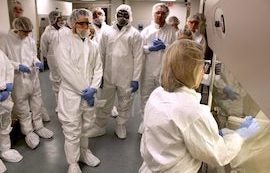Introduction to Biotechnology is one of several online and in-person courses the Institute offers for biopharmaceutical employees
The University of Rhode Island Pharmaceutical Development Institute has teamed up with RI Bio, Back to Work RI, and Rhode Island’s Department of Labor and Training to introduce workers to careers in biotechnology. “Introduction to Biotechnology” is a free, virtual course providing an overview in the STEM (Science, Technology, Engineering & Math) fields.
Presented by Dr. Beth Zielinski-Habershaw, coordinator of training at the URI College of Pharmacy’s Pharmaceutical Development Institute, the three-part course covers current trends in biotechnology, spanning marine, agricultural and medical biotechnology. It will introduce students to careers as diverse as fish farm technician, agricultural product development and medical biomanufacturing technician. It also includes information on pharmaceutical development, as well as antibiotic and vaccine development. Participants will learn the skills desired by science and technology employers and make connections with Rhode Island biotech employers.
“Our mission is to support the economic development of the region’s pharmaceutical and biotechnology industries and expand the life sciences workforce,” Zielinski-Habershaw said. “Biotech work is extremely fulfilling. The goals within the biotechnology industry are to design products and processes that improve the quality of life for the patient and provide solutions for environmental issues. These goals positively impact communities locally, regionally and globally.”
The on-going partnership is aimed at helping workers displaced by COVID-19 find new careers, as well as returning veterans and the unemployed. Intro to Biotechnology is self-paced and generally takes about two weeks to complete.
“Biotechnology is an exciting, rapidly growing field that provides good, family-sustaining jobs,” said Carol Malysz, RI Bio executive director. “And they’re not just laboratory jobs. Biotechnology offers many different kinds of opportunities to make exciting discoveries and solve difficult problems. Our industry partners are continually looking for skilled workers, and this course will help people get started on the path to science and a rewarding career.”
Zielinski-Habershaw is also teaching a follow-up course, Developing Lab Skills, in which participants learn the science and laboratory techniques behind biotechnology, helping lead to potential opportunities in the industry.
These are just some of the comprehensive in-person and online training sessions the Institiute offers for biopharmaceutical employees and students, taught by experts with extensive industry experience. For more information and to apply, visit the PDI Training Center website. Other courses include:
Intro to Biopharmaceutical Manufacturing
This course is designed for biopharmaceutical manufacturers to ensure employees achieve proficiencies in both upstream and downstream biopharmaceutical manufacturing. Students learn the importance of aseptic techniques, and apply this knowledge in hands-on laboratories.
Advanced Chromatography
This course is intended to educate participants in the principles and practices of current chromatography methods used for advanced downstream refinement of therapeutic proteins in the biopharmaceutical industry. Theories and best practices, critical for success in industrial chromatography, are presented including resin and column choices, as well as column packing and final protein purification.
Upstream Aseptic Processing
This course is designed for biopharmaceutical manufacturers to ensure that their employees, who are working in upstream processing, have clear understandings of and the technical accumen for aseptic cell culture and scale-up. Lectures and laboratory experiences prepare participants for work in upstream bioprocessing suites, which includes maintenance and monitoring of aseptic environments while culturing mammalian cells.
Cleaning and Environmental Monitoring
This course introduces biopharmaceutical personnel to best practices, regulatory expectations and industry trends in the disciplines of facility cleaning, validation and environmental monitoring. Instruction and laboratory work focus on essential industry guidance protocols that govern the effectiveness of cleaning procedures. Course materials cover facility cleaning methodologies, environmental monitoring and validation procedures, and include extensive hands-on exercises.
Validation
In this 1.5-day validation workshop, students will explore the history of validation, the approaches to validation, and what equipment must be validated. Students will learn the fundamentals and importance of all aspects of validation with a focus on equipment validation (IQ and OQ) in the manufacturing of biopharmaceuticals and gain hands-on experience with temperature mapping and analysis of mapping data of critical equipment.
Quality/Compliance
In this 1-day Quality/Compliance workshop, individuals will gain knowledge of quality management systems, explore aspects of the principles and responsibilities of a quality unit, and understand the role quality assurance plays across functional areas and the importance of a quality culture. Individuals will learn the fundamentals and importance of a robust compliance program, and gain hands-on experience performing a mock compliance audit.

